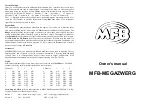
Inverse/Multiple
Inverse is a voltage-inverter with additional offset-function. Any control voltage sent to input
In will be inverted and send to output Out. As an example, this allows to create a negative
modulation using the envelope section. Offset controls the threshold value from which the
signal will be inverted. 0V means “+” becomes “–“ and “–“ becomes “+”. 5V means “0”
becomes “5” and “5” becomes “0”. 10V means “0” becomes “10” and “10” becomes “0”.
The 1 > 3 Multiple section serves to duplicate cv- and audio-signals. An example would be to
route the LFO’s output to multiple destinations. Output Buf Out offers a low impedance
signal. This jack cannot be used as input.
Digital Delay
The multitap-delay generates delay times between approx. 2 ms and 4 sec. Adjust the delay
time using the Time control, while input CV Time allows modulation of this parameter. The
Range control broadens the time range or narrows it to a ms-range. Audio signals enter this
section at input In which is internally wired to the filter’s output. The output is available at
Out. Feedback sets the amount of signal fed back from the delay output back into its input.
With FB Send and FB Return jacks you can access the delay’s feedback loop and send it to
any other module or effects processor and back into the feedback loop return. In addition, the
feedback-signal can be set to infinite playback. To do so, enable the Freeze switch or send a
positive control voltage to Freeze In.
Attenuator
MEGAZWERG offers two attenuators Att1 and Att2 that can be used to manually limit or
amplify audio- und cv-signals as well as cv-sources. Attenuation is set using Att1 and Att2
controls from 0 to center-positions. Higher values result in signal amplification. With
unpatched inputs, the outputs will be steady cv-signals ranging from 0 to 10 volts.
MIDI
MIDI note commands and velocity data (via gate) are received at the MIDI input. The MIDI-
channel is set using the dip-switches at the unit’s rear as follows:
Channel 1
2
3
4
Channel 1
2
3
4
1
ON
ON
ON
ON
9
ON
ON
ON
OFF
2
OFF
ON
ON
ON
10
OFF
ON
ON
OFF
3
ON
OFF
ON
ON
11
ON
OFF
ON
OFF
4
OFF
OFF
ON
ON
12
OFF
OFF
ON
OFF
5
ON
ON
OFF
ON
13
ON
ON
OFF
OFF
6
OFF
ON
OFF
ON
14
OFF
ON
OFF
OFF
7
ON
OFF
OFF
ON
15
ON
OFF
OFF
OFF
8
OFF
OFF
OFF
ON
16
OFF
OFF
OFF
OFF
Start/Stop and Clock jacks are interconnected to MMC-Start/Stop and MIDI-Clock. Use dip-
switches 5 and 6 to set the output as follows:
Switch 5
ON = start 0 volts, stop 5 volts
OFF = start/stop (1 impulse each)
Switch 6
ON = clock 1/96
OFF = clock 1/16
Owner’s manual
MFB-MEGAZWERG




















